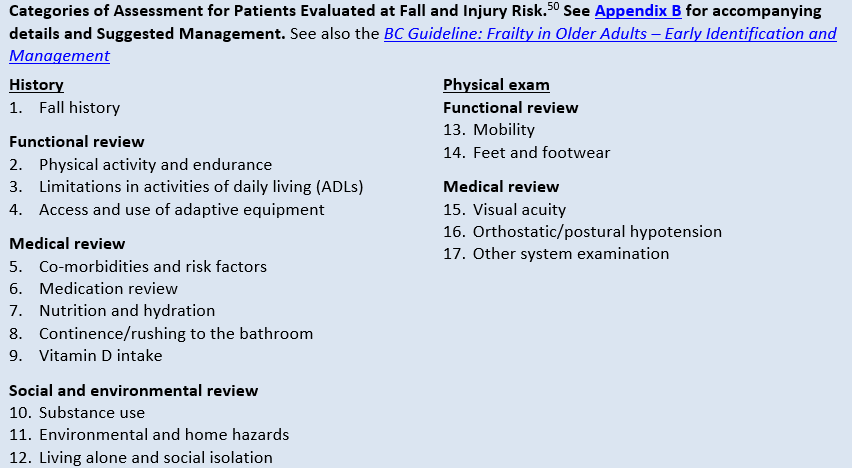The Greatest Guide To Dementia Fall Risk
Table of ContentsThe Greatest Guide To Dementia Fall RiskAn Unbiased View of Dementia Fall RiskThe 7-Minute Rule for Dementia Fall RiskTop Guidelines Of Dementia Fall RiskDementia Fall Risk - An Overview
Ensure that there is a designated location in your medical charting system where team can document/reference scores and record appropriate notes associated to fall prevention. The Johns Hopkins Autumn Threat Analysis Device is one of several devices your personnel can use to help stop unfavorable clinical events.Client falls in healthcare facilities prevail and devastating damaging events that continue regardless of decades of initiative to reduce them. Improving communication throughout the analyzing nurse, care team, client, and individual's most included good friends and household might reinforce fall prevention efforts. A team at Brigham and Women's Hospital in Boston, Massachusetts, sought to create a standardized fall avoidance program that centered around enhanced interaction and client and household interaction.

The innovation team stressed that successful implementation depends upon client and team buy-in, assimilation of the program into existing process, and fidelity to program processes. The group noted that they are grappling with just how to make sure connection in program implementation during periods of crisis. Throughout the COVID-19 pandemic, for instance, a rise in inpatient falls was associated with limitations in person engagement in addition to limitations on visitation.
Dementia Fall Risk Can Be Fun For Anyone
These events are typically taken into consideration preventable. To apply the intervention, organizations require the following: Access to Loss TIPS resources Loss TIPS training and retraining for nursing and non-nursing personnel, consisting of brand-new registered nurses Nursing workflows that enable individual and family members interaction to conduct the falls assessment, make certain use the prevention strategy, and perform patient-level audits.
The results can be extremely destructive, typically accelerating client decline and causing longer health center remains. One research study estimated keeps enhanced an additional 12 in-patient days after a person fall. The Autumn TIPS Program is based on engaging patients and their family/loved ones across 3 primary processes: assessment, customized preventative interventions, and auditing to make sure that individuals are engaged in the three-step autumn avoidance process.
The patient evaluation is based upon the Morse Loss Range, which is a validated fall danger assessment tool for in-patient health center settings. The scale consists of the six most typical factors clients in medical facilities drop: the individual autumn background, high-risk conditions (including polypharmacy), use IVs and various other external tools, psychological condition, gait, and mobility.
Each threat element relate to one or more actionable evidence-based treatments. The registered nurse creates a strategy that integrates the interventions and is noticeable to the care team, patient, and family on a laminated poster or published visual help. Nurses create the plan while fulfilling with the person and the individual's family.
Examine This Report on Dementia Fall Risk
The poster acts as an interaction tool with other members of the individual's care team. Dementia Fall Risk. The audit component of the program includes evaluating the individual's understanding of their threat elements and avoidance strategy at the system and health center levels. Nurse champs carry out at least 5 individual interviews a month with patients Visit This Link and their households to look for understanding of the fall avoidance strategy

A projected 30% of these drops result in injuries, which can vary in intensity. Unlike other damaging events that require a standard clinical action, loss avoidance depends extremely on the demands of the person.
An Unbiased View of Dementia Fall Risk

Based on auditing results, one site had 86% conformity and two sites had more than 95% conformity. A cost-benefit analysis of the Fall suggestions program in eight health centers estimated that the program cost $0.88 per patient to carry out and resulted in financial savings of $8,500 per 1000 patient-days in direct costs associated with the prevention of 567 tips over Read Full Report three years and 8 months.
According to the technology team, companies curious about executing the program needs to carry out a readiness assessment and falls prevention gaps analysis. 8 Furthermore, companies ought to make sure the required framework and workflows for execution and establish an application plan. If one exists, the organization's Loss Prevention Task Pressure must be associated with preparation.
Rumored Buzz on Dementia Fall Risk
To start, companies must make certain completion of training modules by nurses and nursing assistants - Dementia Fall Risk. Hospital staff need to examine, based on the needs of a medical facility, whether to utilize a digital health document printout or paper version of the loss avoidance strategy. Implementing teams ought to recruit and train nurse champs and establish processes for bookkeeping and reporting on fall information
Staff require to be entailed in the procedure of redesigning the process to involve people and family members in the evaluation and avoidance strategy procedure. Equipment ought to remain in location to make sure that devices can comprehend why a fall occurred and remediate the cause. More specifically, nurses ought to have networks to give continuous feedback to both personnel and device leadership so they can readjust and enhance fall avoidance workflows and connect systemic use this link problems.